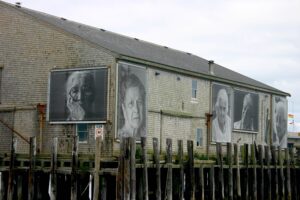PROVINCETOWN — Almeda Segura, Eva Silva, Mary Jason, Bea Cabral, and Frances Raymond. Since 2003, these five women have kept an eye on Provincetown Harbor — or rather, their portraits have. Printed in black and white and gazing calmly from the Provincetown Marina’s outermost building, their kind, creased faces are a vivid reminder of the town’s Portuguese fishing heritage.

They and women like them kept the town afloat while fishermen were at sea, working as telephone operators, mail carriers, and pharmacy clerks.
Not for the first time, however, the images of these women are fading. The portrait of Almeda Segura, which for more than 20 years has been the first to greet arriving passengers on the Provincetown ferries, was taken down last month.
An interpretive sign at town-owned MacMillan Pier was also removed several weeks ago, though Pier Manager Jamie Demetriou said an identical copy was reinstalled last week.
The removal of Segura’s portrait is very likely to be temporary, however.
Although the owners of the Provincetown Marina have longstanding plans to renovate the building into a restaurant — a project that would likely require many new windows — owner Ann Lagasse said the portraits of the five women would find a home on the building in any case.
“We are happy to see the art rehung,” Lagasse told the Independent this week. “We have not finalized our longterm plans for the wharf house, but the ladies’ portraits will always have a home there.”
A Years-Long Project
The installation is called “They also faced the sea,” and the five portraits are by photographer Norma Holt, who died in 2013. Holt’s friend Ewa Nogiec, former owner of Ehva Gallery at 74 Shank Painter Road, had suggested installing them on the building at the end of Fishermen’s Wharf in 2001.
“We drove down the pier, and I said here, on this building,” Nogiec said. “No one really celebrated ordinary people, and very often we just forget about older people.”
The portraits are all of Portuguese women, although not all were fishermen’s wives, said photographer Jane Paradise, who was friends with Holt.
Almeda Segura was a captain’s wife, however; her husband, Capt. Lawrence Santos Segura, died in Provincetown Harbor in 1949, according to David W. Dunlap’s online compendium Building Provincetown.
Eva Silva and her husband, James M. Silva, ran a restaurant together, according to Dunlap, while Frances Raymond was the town’s chief telephone operator. Raymond was the oldest living person in Provincetown when she died at 104.
Holt and Nogiec raised $43,000 through the Fine Arts Work Center to have the portraits printed and installed, according to a 2011 story in the Provincetown Banner.
Neither Holt nor Nogiec expected the installation to be permanent. “I was thinking three, four years max, because it’s rainy, it’s windy, and they will blow apart,” Nogiec said.
In 2015, when the privately owned pier was listed for sale, Provincetown resident Jennifer Cabral led an effort to restore the artwork.
“It was really important to me to get the pictures renovated then, so that when the pier changed hands, the new owners would feel pressure to keep them,” Cabral said. “If they were decrepit when the pier sold, it would be sort of an obvious excuse to take them down.”
Cabral worked with a community group called Provincetown 365 to raise $13,600 to reprint and reinstall all five photos.
Holt had turned over the negatives for the portraits to the Pilgrim Monument and Provincetown Museum, and tracking them down was a lengthy process, Cabral said. Printing techniques had changed, too, and Cabral wanted the canvas artwork to be faithful to the original installation.
Although the Fine Arts Work Center and Provincetown 365 helped raise money for the first two installations of the portraits, they do not own the art, Cabral said.
Neither does the Provincetown Public Art Foundation, according to its president, Romolo Del Deo.
The Pilgrim Monument and Provincetown Museum does still have the negatives, however. Interim executive director Courtney Hurst said that Frances Raymond, the woman at the far right of the installation when viewed from MacMillan Pier, is her “great-great-aunt.”
“This is community art,” said Cabral. “It belongs to all of us. It’s on private property at the moment, so it can’t exist without the permission of the people whose building it’s on. As far as maintaining it, it’s up to someone in the community to do it.”
When Charles and Ann Lagasse bought Fishermen’s Wharf in 2016 and renamed it Provincetown Marina, they installed spotlights so the photos could be better seen at night, Cabral said.
About a month ago, however, when the photo of Almeda Segura was taken down, there wasn’t much left of it, according to Michael Infusino, director of the marina. Its outward-facing position meant it was the most exposed to harsh conditions.
At one point, Cabral and others had wondered if plans for the restaurant at the end of the pier would mean the portraits would need a new home.
“My thinking originally had been, ‘Well, we’ll have these for some number of years until they redo or refurbish the building,” said Cabral. “And then it’ll be a discussion in the community what to do with those images.”
According to Lagasse, that discussion will not be necessary. Cabral has been “instrumental in caring for the portraits,” Lagasse said, and her company is happy to continue hosting the images.
“Those women have been shepherding us as we come and go from Provincetown for 20 years,” Cabral said. “Everyone remembers when they first saw them, and they mean something to everyone.”
News editor Paul Benson contributed reporting.
